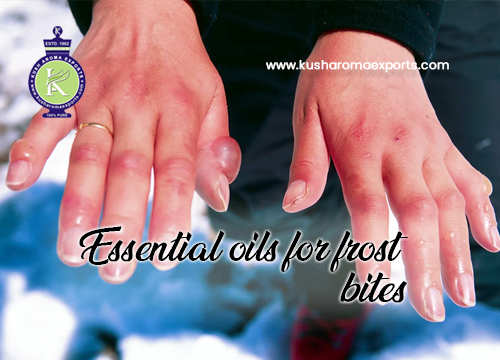As winter blankets the city in its icy embrace, the risk of frostbite becomes a concern. Frostbite occurs when skin and its underlying tissues freeze due to exposure to extreme cold. The symptoms, ranging from numbness to blistering, can be painful and severe. While prevention is the first line of defense, the healing power of nature can also play a crucial role. In this blog, we’ll explore ten essential oils from Kusharoma that can aid in the recovery from frostbite and discuss effective ways to use them.
Understanding Frostbite:
Frostbite is often the result of prolonged exposure to freezing temperatures, which causes ice crystals to form within the skin cells, leading to cell damage. Wind chill, wet clothing, and poor circulation can exacerbate the risk. Common areas affected include fingers, toes, nose, and ears.
Essential Oils for Frostbites:
- Tea Tree Oil: Known for its potent antibacterial properties, tea tree oil helps prevent infection in frostbitten areas. Dilute it with a carrier oil and gently apply to affected skin.
- Lavender Oil: With its soothing and anti-inflammatory properties, lavender oil can alleviate pain and reduce swelling. Mix a few drops with coconut oil and massage onto the affected areas.
- Peppermint Oil: Peppermint’s cooling sensation can provide relief from the burning sensation associated with frostbite. Dilute and apply to the skin, or add a few drops to a cold compress.
- Helichrysum Oil: This oil is renowned for its skin-renewing properties. Blend helichrysum with a carrier oil and apply to frostbitten skin for healing and regeneration.
- Eucalyptus Oil: Eucalyptus oil’s antimicrobial qualities can aid in preventing infection. Mix with a carrier oil and gently massage onto frostbitten areas.
- Chamomile Oil: Chamomile’s anti-inflammatory and calming effects can help reduce pain and swelling. Mix with a carrier oil and apply to the affected skin.
- Frankincense Oil: Known for its skin rejuvenating properties, frankincense oil can promote healing in frostbitten areas. Dilute and apply as needed.
- Geranium Oil: Geranium oil has antimicrobial properties that can protect against infection. Mix with a carrier oil and apply to frostbitten skin.
- Rosemary Oil: Rosemary’s analgesic properties can provide relief from pain associated with frostbite. Dilute and massage onto the affected areas.
- Cypress Oil: Cypress oil promotes blood circulation, which is crucial for healing frostbitten skin. Mix with a carrier oil and apply gently.
How to Use Essential Oils:
– Topical Application: Dilute essential oils with a carrier oil and apply directly to the affected areas.
– Steam Inhalation: Inhale the steam from a bowl of hot water infused with a few drops of essential oil to aid respiratory symptoms associated with frostbite.
– Compress: Add a few drops of essential oil to cold or warm water, soak a cloth, and apply it as a compress to the affected areas.
Conclusion:
While essential oils from Kusharoma can provide relief and aid in the healing of frostbite, it’s essential to seek medical attention for severe cases. These natural remedies can complement conventional treatments and contribute to a holistic recovery. Embrace the healing power of nature and let Kusharoma essential oils be your ally in combating the effects of frostbite this winter.
Remember, prevention is key, so dress warmly and stay vigilant in cold weather to protect yourself from the dangers of frostbite. Stay safe and enjoy the winter season with the support of nature’s bounty.


